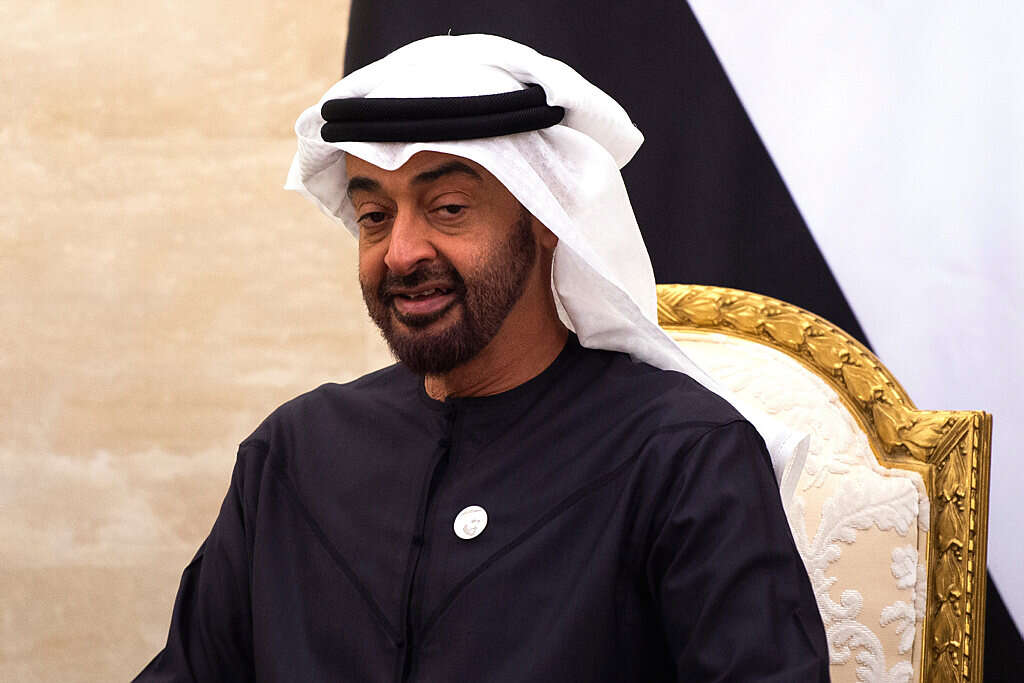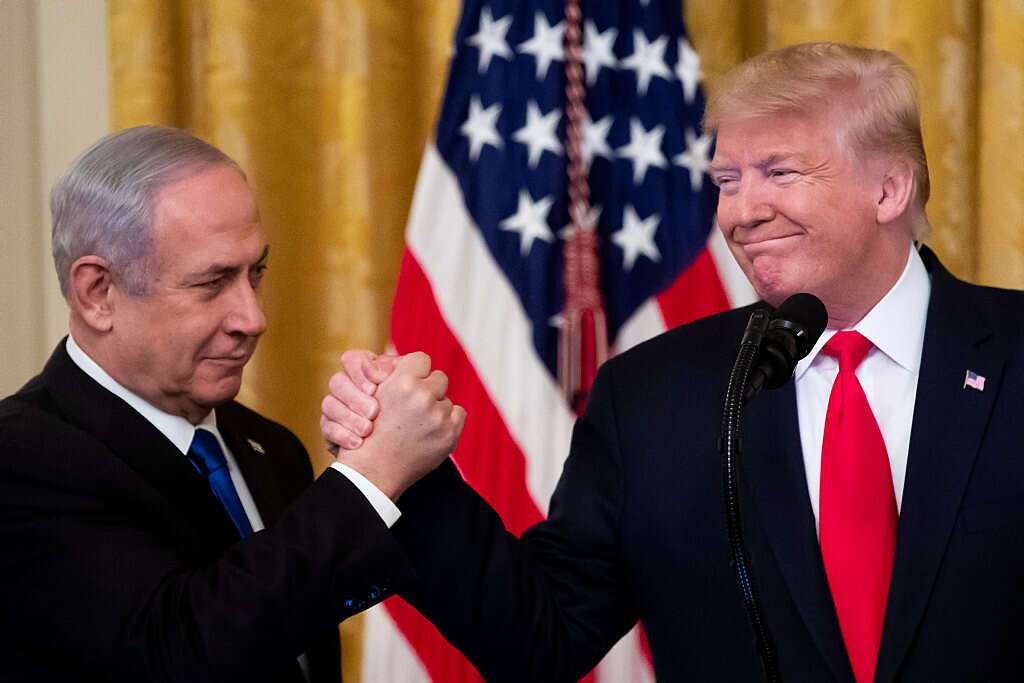I don't recall the last time I saw Prime Minister Benjamin Netanyahu as relaxed and content as he was on Sunday – apparently the afterglow of the peace treaty with the United Arab Emirates and a sense of making actual headway instead of tilting at windmills.
It's true that most of the praise has come from newspapers such as The New York Times, rather than the Israeli press, but the international viewpoint is also something.
Follow Israel Hayom on Facebook and Twitter
Q: If you will, Mr. Prime Minister, play the role of media pundit for a moment. [New York Times columnist] Thomas Friedman described this peace initiative as a geopolitical earthquake. What does he mean?
"I don't know what he meant, but I do know what I meant," says Netanyahu. "For years I've rejected the notion of land for peace, that is to say, a peace predicated on Israeli withdrawals and Israeli weakness. I contend: Peace for peace, and peace from a position of strength – not weakness."
According to the prime minister, the treaty came to fruition because he "worked to establish Israel's might – economically, through a free market and technological capability, and also diplomatically by integrating our economic and military capabilities. I think the big change in the Middle East, as far as the attitudes of Arab countries [toward Israel], was the result of my stance against the nuclear deal with Iran. Against Iran's belligerence. Many countries in the region saw Israel, under my leadership, as a country morphing from enemy to critical ally."
Q: Does this mean that if we hadn't stood against the nuclear deal – the Arabs would now be on the side of the Iranians?
"I don't know if they'd be on Iran's side, but they wouldn't be on our side. In the Middle East, you make peace with the strong, not with the weak. I cultivated Israel's strengths: through my policies, Israel became very powerful – from an economic perspective, robust militarily and technologically, a cyber power, and strong international standing. A country that is courted by countries on all continents. Arab countries took heed of this."
Netanyahu adds that "they especially took note – and I know this personally – of my staunch opposition to Iran and my willingness to stand firm on the world stage against a danger that threatens them as well."
Q: Does this staunch stance include certain actions we took in certain places? Not just in Syria?
"Of course. [They] know we've taken action. I sent Mossad agents to the heart of Tehran to extract the nuclear archive."
Q: Were there other operations as well?
"There are other activities that they believe we carried out."

'We've become a cyber powerhouse'
Q: People are saying this is likely your "legacy" as prime minister. Will there be another country [after the UAE]? Who is next?
"I don't say this is my legacy. My legacy is first and foremost transforming Israel from a quasi-socialist country to a free-market country.
"We cultivated here a revolution of infrastructure, roads, trains, and interchanges. We changed the face of the country. We extracted natural gas from the sea. We turned Israel into a cyber powerhouse. Generally speaking, my legacy is that I'm altering Israel's course by cultivating our four strengths – economic, military, diplomatic and ethical. The ethical clout, among other things, stems from shifting out of peace from a position of weakness to peace from a position of strength.
"My adversaries, including Ehud Olmert, said just a few days ago that no Arab country would make official peace with us until we resolve the conflict with the Palestinians."
Q: Phillip Gordon, special assistant to former US President Barack Obama, said, "Israel's vision of normalizing relations with Arab countries without an agreement with the Palestinians is a fantasy … The path to normalization with Arab countries still passes through the Palestinian issue, not the other way around." What did he get wrong?
"This approach eternalizes the Palestinian veto on Zionism. Nothing has changed since the Balfour Declaration. It lets the most ardent extremists hold Israel and Arab countries hostage. They never agree. Whether it was the Clinton or Obama plan, or the most far-reaching concessions the Left was willing to make – the Palestinians were never willing to agree. As a result, peace with Arab countries will be forever put on hold."
The prime minister, however, contends that "if Israel is strong and aggressive enough, as I was against Iran, we can change their attitude toward us. And toward me as well. And the attitude did change. They saw me taking a stand against a common threat. The approach was different. The earnestness was different. Hence this approach is behind the times.
"For the first time in a quarter-century, we aren't making peace on the basis of Israeli concessions and withdrawals; as was the case with Egypt and Jordan."
Q: Regarding sovereignty in Judea and Samaria, some people claim it was a bluff that helped you create a bargaining chip you used to get the UAE to sign the peace treaty.
"It wasn't a bluff. For three years, I worked toward sovereignty. I inserted it into President Trump's peace plan. According to the American plan, Israel will receive 30% of Judea and Samaria – 10 times more than any other plan – without uprooting communities and retaining territory vital to Israel's security. This is the American plan. It hasn't changed. I made it happen.
"It's true that immediately after the announcement of the Trump plan I wanted to present it to the government and they wanted me to wait, and again asked me to wait to allow them to focus on the peace agreement with the UAE, and possibly with other countries as well. The insistence on sovereignty and including it in the president's official plan is a huge alteration. It changed the cards."
Q: Could we see a change in the White House come November?
"I think the concepts have changed. The idea that we will return to the 1967 borders, uproot communities – these things, for all intents and purposes, are no longer on the table. This change, which I worked with President Trump to introduce, will be effectual down the road as well, in my opinion. Just as I worked to relocate the US Embassy to Jerusalem, just as I said I'd work to secure recognition of Jerusalem [as Israel's capital] – and it happened. I spoke about recognition of our sovereignty on the Golan Heights – and it happened. And there are more examples. It takes time. I said I'd work to stop Iran, and people snickered.
"This is the power of an idea. The arrangement that stipulates Israelis will stay where they are and that we won't do any ethnic cleansing – we pushed this forward despite what was accepted in the past."
Q: Within the framework of our internal politics, do you think it will be possible to ratify sovereignty in the coming year?
"People who opposed the sovereignty initiative are from the Right, and now they're asking why we gave it up. It's absurd. It stems from extraneous considerations."
Q: You have rejectionist coalition partners on this issue – Blue and White leader Defense Minister Benny Gantz and Foreign Minister Gabi Ashkenazi. You didn't even bother to let them know about your moves with the UAE.
"Let them know? I've been dealing with this for years. They've been here all of two months. That was the [coalition] agreement – maintain discretion, to prevent Iran and others from torpedoing it."
Q: Do you think Gantz and Ashkenazi would have leaked something to Iran?
"Not to Iran. I didn't say they would leak to Iran. They can speak with advisers and this information could get out."
Q: Do you see your partnership with Gantz lasting at least three years?
"If they don't conduct themselves as a government within a government and as an internal opposition – then the answer is yes. Otherwise, it will collapse on its own. I hope it doesn't fall apart now. We just recently established a government to fight the coronavirus. We'll do everything in our power to keep it together."
Q: Apparently, as we saw on Friday, the United Nations Security Council doesn't want to renew the arms embargo on Iran. What do we do about this?
"We will do everything we need to protect ourselves," Netanyahu says, reiterating his view that the UNSC's vote is an outrage.
"The fact that the international community hasn't rallied behind the United States' call to renew the arms embargo on Iran, is a badge of shame of the international community. I believe the US will act on this front. We, too, are taking action to prevent Iran from getting stronger."
According to the prime minister, "Many of those patting themselves on the shoulder about standing against the Iranians did not agree with my position. I'm talking first and foremost about Yair Lapid, who criticized my trip to Congress to condemn the nuclear deal, along with many others in the army and, to my regret, the rest of the defense establishment."

'The Congress speech helped'
Q: Do you see a connection between your speech before Congress in March 2015 to this diplomatic achievement now?
"I suggest you interview the leaders of the region, when you get the chance, and ask them that. They would give you a very clear cut answer."
Q: Again, will other countries follow in the UAE's footsteps?
"I believe so. When I said we could achieve peace – six years ago, including in speeches at the UN – people didn't take it seriously. But the idea is trickling down."
Q: The agreement isn't viewed favorably by the settlers who opposed the sovereignty initiative. Could they enlist the Evangelicals in the US to intervene against Israeli policy?
"There's a misconception here. It's not that I had the option – choose between implementing sovereignty and the peace treaty. From the outset, I said I would only pursue sovereignty with consent from the US, and that applying sovereignty without such consent would be irresponsible and jeopardize the settlement enterprise, and Israel as a whole, by triggering harsh anti-Israel measures from the international community. American agreement was a clear precondition.
"When [the Americans] asked me, upon the unveiling of the [Trump peace] plan and now, to put sovereignty on hold to facilitate the [UAE] treaty – they didn't let me choose between them. They said that was their position. Therefore, if implementing sovereignty right now isn't feasible and it has to be suspended for a period of time, it's preferable that we at least get the peace treaty. I didn't choose one over the other."
According to Netanyahu, "Anyone who wants to act unilaterally and without US support would be making a gross mistake; it's not the right thing to do. Anyone who wants to lead the country responsibly won't do this either."
Q: Shifting to another topic, Hamas' arson campaign in the south. Usually, we deliver our major military strike after four rounds of fighting. Maybe we should do so after four balloons?
"It would behoove the Palestinians to remember what happened in the previous rounds. It led to targeted assassination and very strong measures on our part. I advise them to search their memory. Ultimately, our actions are our guarantee that in Gaza they understand that if this situation continues, the attacks they are experiencing now will be a drop in the bucket compared to what will come later."
Subscribe to Israel Hayom's daily newsletter and never miss our top stories!




